Half a century of bringing news to the breakfast table
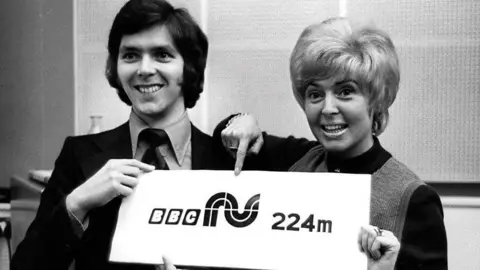 BBC
BBCIt has provided the soundtrack to breakfasts and morning commutes across Northern Ireland for half a century.
BBC Radio Ulster's flagship news programme is celebrating 50 years on the air.
If you allow for a short interlude when the programme was called Breakfast Special, Good Morning Ulster is the station's longest-running programme.
Back under its original title, the show is still going strong with current presenters Chris Buckler, Sarah Brett, and Joel Taggart joining listeners every weekday morning between 06:30 and 09:00.
Former presenter of the programme Wendy Austin recalls the brief name change in the 1990s as something of a mistake.
"Talk about throwing away a great title and choosing something that sounded like a cereal," she said, appearing on the programme recently to mark the 50-year milestone.
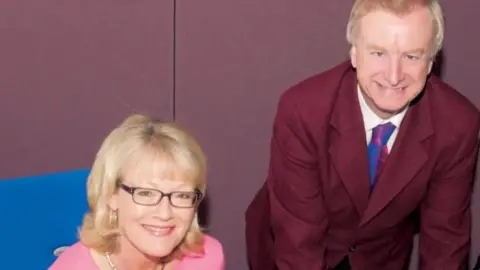
And according to her long-time presenting partner Seamus McKee, it was far from the only hiccup in the show's history.
McKee recalled one [very short] interview with a contributor in Bangladesh on a bad line.
"Over the roar only one yell each side was able to make the journey.
"Presenter: What's it like there?
"Reply: The land is very flat."
Regular listeners will, of course, be familiar with the occasional mishap; dodgy phone lines still among them.
Current presenter Chris Buckler said that is all part of the fun of live broadcasting.
"There are people who really hate it when it goes wrong, I really like it when it goes wrong. I really like it when the radio starts to run away with itself."
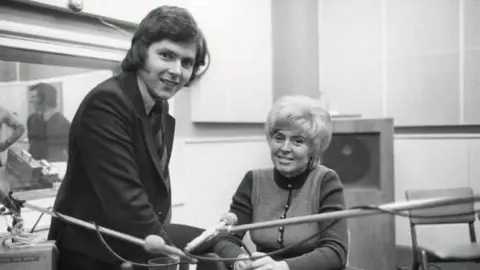
Since its launch, Good Morning Ulster has been presented by some of Northern Ireland's best-known broadcasters.
The very first of those was George Hamilton.
Originally from Belfast, Hamilton is now known best for his work in the Republic of Ireland for RTÉ.
Hamilton remembers the original purpose of the programme was "to offer a proper full coverage service" and "to lift local coverage to what the place deserved".
Hamilton said that he still listens occasionally and said there's a lot more "levity and conversation" now compared to his day.
"It's the way of the world now, and the ways thing have changed over 50 years, styles change," he said.
"You could compare it to the wearing of ties.
"I might well have worn a tie to present Good Morning Ulster, but that's no longer de rigueur."
Lighting scripts on fire
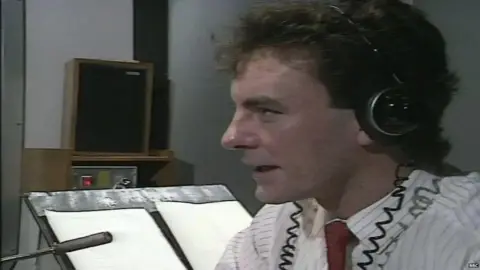
The ability of Good Morning Ulster to set the news agenda is often in the interviews that it secures.
The coveted, or perhaps dreaded, first slot after 08:00 has been treaded by prime ministers, first ministers, civil servants, campaigners, and CEOs.
One current minister in the Northern Ireland Executive, Health Minister Mike Nesbitt, has even sat on both sides of the desk.
The former journalist, now Ulster Unionist Party leader, presented Good Morning Ulster from 1986 to 1990.
Nesbitt said he "thought it was the the best job I ever had in broadcasting".
"It's so immediate, one phone call and you're talking to the principal or the eyewitness, and starting so early in the morning you feel like you're getting the march on everybody else."
Now as health minister, Nesbitt said he welcomes the kind of "probing interview" he knows he will get on the programme.
"It keeps you on your toes, it keeps you right. If you can't answer the questions then there's a problem."
One thing that Nesbitt remembers fondly from his time presenting is the pranks he used to play on sports presenter Adam Coates, including once setting his script on fire as he was reading it.
"He was doing the sports bulletins and I smoked in those days so I had a lighter and I did it as he was finishing off."
Nesbitt said the final few lines of the script were read "at some pace" that day.
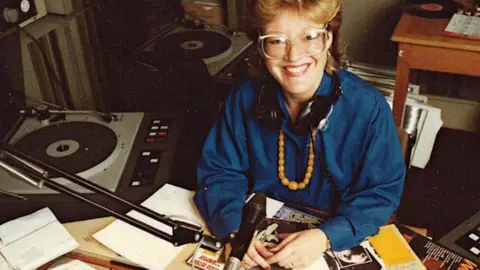
The worst of news, and the best of news
The power and reach of the programme has also been used to platform lesser-known voices.
"The politicians are really important," Chris Buckler said, "because it's about holding people to account.
"But there's no point having a politician on if you don't have somebody on who will tell you what the impact of their actions or inactions are and that is what makes it really strong."
Damien Magee, editor of daily news programmes at BBC Northern Ireland, said Good Morning Ulster had "guided listeners through some of the most momentous occasions in Northern Ireland's history, explaining, dissecting and breaking some of the biggest news stories of this place".
"We are committed to continue doing that for our audiences across Northern Ireland," he added.
Wendy Austin remembers reporting on the signing of the 1998 Good Friday Agreement on the programme.
"I think most of us couldn't really believe that this had happened," she said.
"It was one of many really remarkable mornings when you did feel something special has happened."
Austin added that it also stood out among so much tragedy covered by the programme: "There were so many mornings which were just ghastly".
McKee echoed this sentiment: "As people were waking up we had to find a way to bring them the worst of news in the worst of times and the best of news in the best of times".
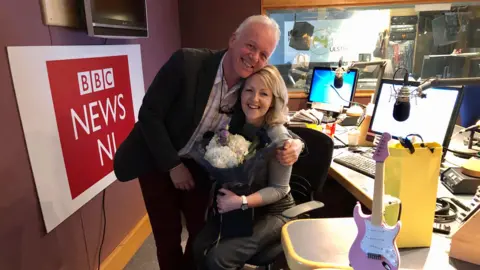
Karen Patterson said that it was "daunting but exciting" when she and Noel Thompson took over the reins of presenting Good Morning Ulster from McKee and Austin.
Patterson said the programmes she particularly enjoyed were when running orders were thrown out the window and the programme was responding in real time to live events.
"The one where that really came into its own for me was arriving in on the morning of the Primark fire," she added.
Patterson said that after arriving into work that morning and going down to see how bad the damage was, she decided to present the programme live from the scene.
She said that as she stood there with a microphone as floors of the building began to collapse, members of the public sought her out to tell their stories and share "the affection and nostalgia and history of that building at the heart of the city".
"When Good Morning Ulster is at its best it is feeling like there's someone on your side who gets you and asks the questions you want asked," she said.
"There's someone who can ask the tough questions but have enough empathy and heart and soul to get this place."
Another 50 years?
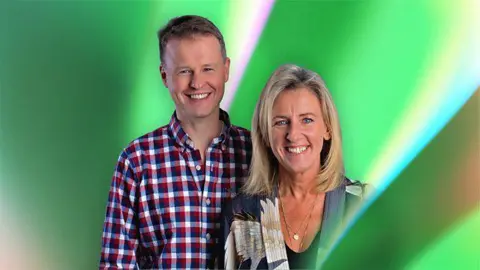
Buckler said that he hopes Good Morning Ulster will still be here in another 50 years time, adding that in order to do so it "needs to stay relevant".
"Our listening figures are still very, very strong, and that's because people tune in, particularly in Northern Ireland, where there is a huge interest in news."
He added the value of live radio is that in the era of a "segmented" podcast market "you are doing a broad range of subjects and you are broadcasting to a broad range of people".
Buckler said that there is "never a day when you walk in to that radio studio that you're not aware that actually this is a really old programme with heritage".
He said he feels the history both within the BBC but also within his own family.
"It's an honour to do the programme because its one that my parents tuned into and one that my grandparents tuned into."
